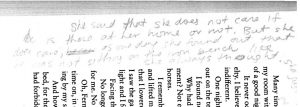FIN
And here comes the last week of classes of my first year. RMST 202 just may be one of my favorite classes I’ve taken this year, and it was such an eye-opening experience about university level classes in general. I’m not sure if it will be the same in the future for my remaining three years or if this is just one of those really cool and unique classes that I got lucky with.
Anyways, I remember that in one of the first classes, during the snowy week, we talked about the difference between reading and reading, which is something that sort of stuck with me as we went through the course. I was never really a reader.. I mean, I used to love reading as a child, so much that I would finish the thin children’s books on the way home from the bookstore, but somewhere along the way, probably when I got introduced to technology, I just stopped reading for leisure. From last year though, I made a promise to start reading more and get back into novels (which I didn’t really succeed in), and it only took this class for me to fall in love with literature again, or maybe for the first time, in a way I have never before. I remember reading the ratemyprof comments before taking the class and reading stuff like ‘be ready to get called on’ and getting really scared of the first class. It still does kind of terrify me but it was much better than I expected, and I loved writing blogs on what we read however we want, without any pressure to be academically ‘correct’. I think that is what makes this class different than the others; other than the obviously unique contract system, the fact that we can express our opinions and discuss with each other in the blogs and in class makes me think about how much I can learn from my fellow classmates as much as I do from the professors. Everyone has a unique perspective on the novels – some hate it, some find it hard and confusing, and some adore it!
For me, my absolute favorite would have to be If on a winter’s night a traveler by Calvino.. As much as I enjoyed reading the others (not Combray though..), that book stayed with me and will probably make it in the tops of my list of less-than-50 books I’ve ever read in my entire life. Reading about the process behind the books that we read, reading different books every other chapter, and reading about ‘myself’ as the reader was evermore enjoyable and fun to read. I would love to find more books like that!! I think I just really like meta-fictional stuff, even in movies and tv shows. For my least favorite, I would unfortunately have to say Combray, I suppose since it was the first read, especially for a non-reader like me, I found it hard to enjoy. BUT I will definitely give the book one more try and read it again soon. I think, as I’ve said in a previous blog, that the books have been getting easier and more digestible the further we get into the course, which is likely because we have been getting more used to and have been learning how to read not just read for the sake of reading. Something I realized from this change is that it is much easier for me to get into the focus and read for long periods of time without getting distracted after like one paragraph, which is something I’ve always done when reading. Not only that, I just found myself enjoying every novel, even more so after our class discussions and the video lectures our professor makes. The difference between scanning a text and summarizing it and really understanding it to form your own opinion is crucial, as someone who never really talked about their opinions on literature nor had people to talk about it with.
For this I would like to say thank you to professor Beasley-Murray, the lovely TAs, and my classmates, for expanding my horizon and helping me enjoy literature again. Thank you to RMST202 for being such a fun and educating class. I am more than ready to read so much more novels in the future!!
My question is: (I can’t believe it’s the last T.T)
For the previous non-readers who took this course, did it help you read better and do you think you will enjoy literature more now? As for the readers, how did this class change your perception of literature, is it different than the usual novels you read?
Have an amazing summer everyone!


